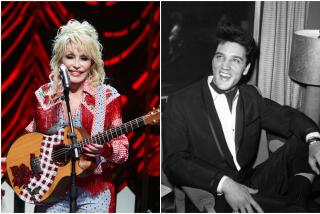Wonder Wins Suit Over Song
Pop star Stevie Wonder won a major copyright infringement lawsuit Thursday when a Los Angeles federal court jury found that the blind singer-composer did not plagiarize the award-winning song “I Just Called to Say I Love You” from another songwriter.
“God is good. I knew the truth all along,” Wonder told a crush of reporters outside the U.S. District Courthouse after the verdict was announced.
Wonder said he was thankful for the result, but he added that listening to television and radio commentators speculate in recent weeks on whether he had stolen the song caused him considerable pain.
“I felt hurt that someone felt I would steal a song,” Wonder said.
“As much as I appreciated the Oscar, the Grammy, none of this stuff means anything to me. It is far more important to have dignity, to know what you feel in here,” he continued, pointing to his heart.
The four-man, two-woman jury, after listening to two weeks of testimony, deliberated only 3 1/2 hours before announcing its verdict.
Their deliberations stemmed from of a $25-million copyright infringement suit filed by Lloyd Chiate, 40, who claimed that Wonder pilfered a song he had written in 1976 and converted it into the tune that won an Academy Award and a Grammy Award in 1985.
Wonder, 39, who has sold millions of records and has been inducted into the Songwriters Hall of Fame, said he got the idea for the song in July, 1976, while being driven to a hotel in Hollywood from his mother’s house in the San Fernando Valley.
He testified that he created “enough of a working idea for a verse and a chorus” during the ride to make a recording of the song the same day--but that he changed the tune over the years and did not record its final version until 1984.
Chiate testified that he and another songwriter, Lee Garrett, wrote the song in 1976 but that they did not register it until 1979.
Chiate’s attorney, Herbert Dodell, said Wonder had stolen the song after Garrett played it for him in 1977. Garrett originally was a co-plaintiff in the suit, but he later switched sides and testified for Wonder.
Tapes of both original versions were played during the trial.
Jury foreman Robert Apelzweig said the tapes were critical in the jury’s unanimous decision.
“We saw virtually no similarity of melody,” said Apelzweig, 39, a Pasadena research chemist. As to the similarity of some of the lyrics, he said, the jurors decided that the words ‘I just called to say I love you,’ were not unique enough to warrant a conclusion that one song was a copy of the other.
U.S. District Judge David W. Williams, who presided over the trial, said from the bench that he concurred with the verdict.
Williams’ handling of the case was severely criticized by Chiate’s lawyer, who at one point asked for a mistrial because of comments the judge made to the jury.
“He kept out evidence that would support our position and admitted evidence that would support their position,” Dodell said. “He was totally biased. It proves David only wins against Goliath in the Bible.”
Wonder’s lawyer, Howard King, praised Williams’ handling of the trial, as did jury foreman Apelzweig.
Chiate left the courthouse before the jury returned, saying he could not handle the suspense, and he could not be reached for comment.
King said Wonder had been vindicated by Thursday’s verdict, but added that the past several weeks had been particularly trying for the singer.
The attorney said he thought it was “probably impossible” for someone of Wonder’s stature to totally protect himself from similar suits.
Wonder said at one point he was so upset by the accusations hurled by the other side that he planned to countersue Chiate “for everything he had.”
“But God said to me that’s not the right thing to do,” Wonder told reporters.
The singer even held out an olive branch to Chiate on Thursday, saying he would ask him and Garrett if they would collaborate with him on a song and, if they agreed, all the proceeds would be donated to charity.
“If we’re really righteous enough, that would help people,” Wonder said.
More to Read
The biggest entertainment stories
Get our big stories about Hollywood, film, television, music, arts, culture and more right in your inbox as soon as they publish.
You may occasionally receive promotional content from the Los Angeles Times.










